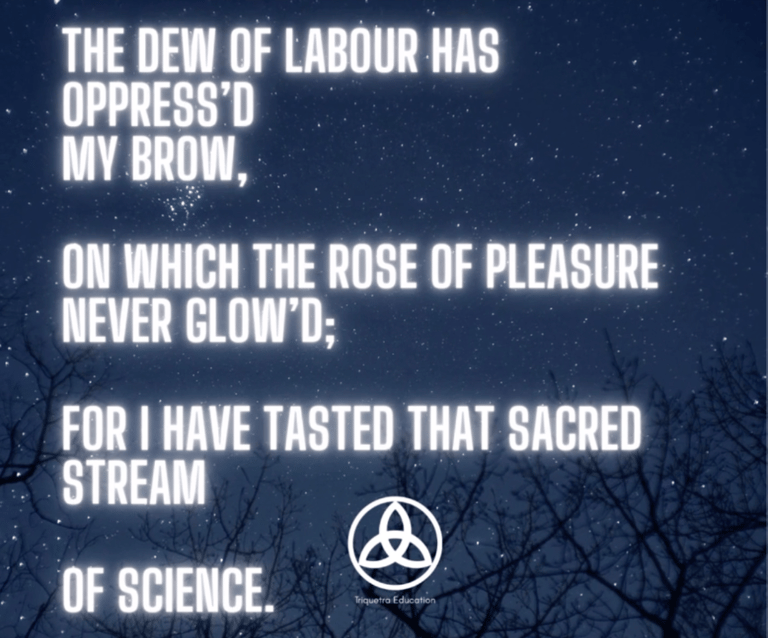The First Romantic Scientist
The Chemist who thought through poetry
9/30/20253 min read


You might not have heard of Sir Humphry Davy. He’s a quietly famous chemist who lived in in the early 1800s. He discovered sodium and potassium, and invented the miners’ safety lamp, eradicating the need for open flames and arguably ensuring the safety of thousands of lives. But he also wrote poetry as a way to help him think across science, philosophy, and art.
A great example of the way he does this is in an untitled poem in his notebooks. In this poem, he opens with the dramatic, and perhaps even melancholic, phrase ’Many days have pass’d / Beloved scene…’. Throughout the poem, he extends this somewhat wistful note, fusing a depiction of Romantic landscape with scientific vision. He often parallels the expression of Wordsworth, discussing moonlight on waves, ‘beloved rocks,’ and extolling the ‘sympathies of nature’, and perhaps it feels like his poem will simply become a soundly expressed part of the Romantic canon. Yet midway it pivots: ‘For I have tasted that sacred stream / Of science, whose delicious water flows / From Nature’s bosom’, and we begin to become involved in Davy’s contemplation of more than the landscape.
When he shifts to his consideration of science, it is not stated in opposition to poetry. Instead the ‘sacred stream of science’ is portrayed as a nourishing, mysterious, and life-giving force, subsumed as part of the natural world itself. He carries over Romantic diction (‘bosom,’ ‘stream,’ ‘plumes of rapture’) into scientific reflection, showing that the two disciplines do not stand separate from one another, but are entwined together, using a joined and complementary lexis of expression. The result is neither purely poetic nor purely scientific, but a hybrid epistemology.
It’s even more than that. His contemplation of the nature of the universe through poetry even anticipates modern physics. He goes on, ‘The mystic laws from whose high energy / The moving atoms, in eternal change, / Still rise to animation’. He sees atomism not as dry materialism, or static, unchangeable elements ready to be discovered in the scientific equivalent of mining, but as elements in flux, as animation, even as a poetics of matter itself. His image of small science is presented in large cosmological imagery, and that cosmology is rendered as lyric.
His poetry is important because goes beyond simply capturing the mood of scientific discovery, it becomes a discourse on recording scientific thought itself. Davy is positioning poetry as a tool to think about what instruments couldn’t yet measure. It is true that he is a Romantic poet, and in that sense he is very similar to Coleridge and Wordsworth who also view self as mirrored in nature. But Davy goes further than them, moving beyond the traditional Romantic focus on the ‘I’ alone, and using the genre of wonder to extend this to the non-human other. He reads the beauty of sublime nature of atomic motion and scientific labour into the very rhythms of poetic verse.
That’s why Humphry Davy is our poet for National Poetry Day! Not only does Davy show us that no subject stands alone, he arguably embodies the title of Romantic Scientist (and possibly the only poet or scientist to do so far!). He’s a chemist who is also a poet, but his poem is also a laboratory, and his Romantic ode is also a proto-scientific meditation. Knowledge for him was always cross-pollinated, and he’s a great reminder that every discipline feeds into the other, and that it is in the spaces of those connections that creative thinking thrives.
Many days have pass’d
Beloved scene, since last my wet eyes saw
The moonbeams gild thy whitely-foaming waves.
Ambitious then, confiding in her powers,
Spurning the prison, --- onward flew my soul,
To mingle with her kindred; --- in the breeze
That wafts upon its wings futurity,
To hear the voice of praise; --- and not in vain
Have these high hopes existed, --- not in vain
The dew of labour has oppress’d my brow,
On which the rose of pleasure never glow’d;
For I have tasted that sacred stream
Of science, whose delicious water flows
From Nature’s bosom. I have felt the warmth,
The gentle influence of congenial souls,
Whose kindred hopes have cheer’d me; who have taught
My irritable spirit how to bear
Injustice; who have given
New plumes of rapture to my soaring wing
When ruffled with the sudden breath of storms.
Here, through the trembling moonshine of the grove,
My earliest lays were wafted by the breeze, ---
And here my kindling spirit learn’d to trace
The mystic laws from whose high energy
The moving atoms, in eternal change,
Still rise to animation.
Beloved rocks! thou ocean white with mist,
Once more with joy I view thee;
One more ye waken in my throbbing breast
The sympathies of nature. Now I go
Once more to visit my remember’d home,
With heartfelt rapture, --- there to mingle tears
Of purest love, --- to feel the ecstatic glow
Of warm affection, and again to view
The rosy light that shone upon my youth.
(From John Davy’s Memoirs, i, 110-111.)
Available at:Davy Notebooks Project
https://wp.lancs.ac.uk/davynotebooks/files/2024/03/Poems-for-Workshop.pdf




